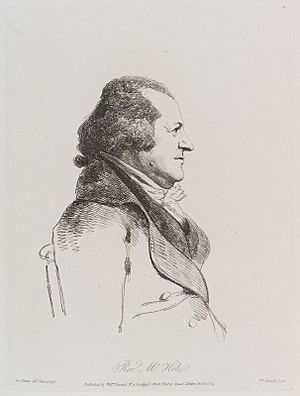Richard Hole facts for kids
Quick facts for kids The Reverend Richard Hole |
|
|---|---|

Etching of Hole by William Daniell (15 December 1809) after a portrait by George Dance the Younger (4 June 1796)
|
|
| Province | Canterbury |
| Diocese | Exeter |
| Personal details | |
| Born | 1746 Exeter, Devon, England |
| Died | 28 May 1803 (aged 55/6) Exmoor, Devon, England |
| Denomination | Anglican |
| Spouse |
Matilda Katencamp
(m. 1776) |
| Alma mater | Exeter College, Oxford, BCL (3 May 1771) |
Richard Hole (born 1746 in Exeter, died May 28, 1803, in Exmouth) was an English poet, historian of old things (called an antiquary), and an Anglican priest. He was known for his writings and his work in the church.
Contents
Richard Hole's Life
Early Years and Education
Richard Hole was born in Exeter in 1746. His father, William Hole, was an important church leader. He was an Archdeacon and a Canon at Exeter Cathedral.
Richard went to grammar school in Exeter. He was known for his funny, dry sense of humor and his good acting skills.
In 1764, he started studying at Exeter College, Oxford, a famous university. He earned a degree in Civil Law in 1771. While at university, he wrote funny stories and even thought about joining the army.
Church Career
After finishing his studies, Richard decided to become a priest in the Church of England. His father's influence helped him get good positions in the church.
He first worked as a curate in Sowton, near Exeter. In 1777, he became the vicar of Buckerell, a nearby church. Later, in 1792, the Bishop of Exeter made him the rector of Faringdon. He was allowed to keep both jobs at the same time.
He also became the rector of Inwardleigh, near Okehampton. He held this position along with Faringdon until he passed away.
Family and Later Life
In 1776, Richard Hole married Matilda Katencamp. She was the daughter of a merchant from Exeter. Matilda lived longer than Richard.
Richard Hole died on May 28, 1803, in Exmouth, after being ill for some time. He was about 56 years old.
Richard Hole's Writing
Richard Hole enjoyed writing from a young age. He wrote many different types of works, from poems to essays.
Early Poems and Translations
Soon after a famous epic poem called Fingal by James Macpherson (who used the name Ossian) came out, Richard Hole turned it into his own poem. His book, Poetical Translation of Fingal, was published in 1772. It also included an Ode to Imagination, which many people liked.
He also translated the second Homeric Hymn into English poetry. This translation was published in 1781 as Homer's Hymn to Ceres. This work was reprinted in many different collections of poems.
Arthur and Arabian Nights
In 1789, Hole published a long poem called Arthur, or the Northern Enchantment. In seven books. Critics said it was similar to the style of Ariosto, another famous poet. The notes in the poem showed that Hole knew a lot about old Norse stories and gods (Scandinavian mythology).
Richard Hole was also an early member of the Exeter Literary Society. He gave a talk there called Remarks on the Arabian Nights' Entertainments. This talk was later published as a longer book in 1797. In this work, he explored where stories like Sindbad's voyages might have come from. He started out not believing they were true, but then began to think they might have some basis in real events.
Other Works and Contributions
Before he died, Hole was working on a book about the travels of Ulysses from Homer's Odyssey. Only the introduction was finished. This part was published after his death in 1807 by his friend Bartholomew Parr. It was called An Essay on the Character of Ulysses as delineated by Homer. In this essay, Hole praised Ulysses's intelligence and good character.
Richard Hole also wrote many poems for a collection called Poems chiefly by Gentlemen of Devonshire and Cornwall in 1792. He also contributed articles to magazines like the Monthly Review, the London Magazine, the British Magazine, and the Gentleman's Magazine. Some of his articles were funny dialogues between imaginary people.
He left behind a notebook with many interesting ideas and writings. It even included a part of a translation of a Latin poem into the old Exmoor dialect. This translation and a story called The Exmoor Courtship were later published in Blackwood's Magazine.
 | Selma Burke |
 | Pauline Powell Burns |
 | Frederick J. Brown |
 | Robert Blackburn |

